各种时态的时间状语及练习
英语16种时态及练习题附答案
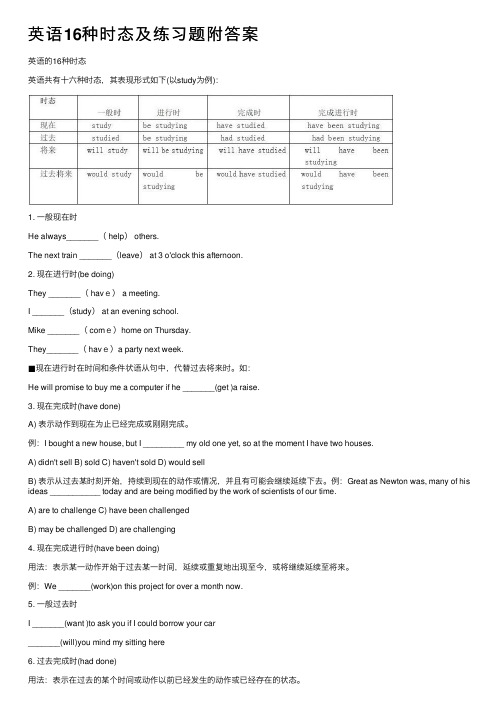
英语16种时态及练习题附答案英语的16种时态英语共有⼗六种时态,其表现形式如下(以study为例):1. ⼀般现在时He always_______( help) others.The next train _______(leave) at 3 o'clock this afternoon.2. 现在进⾏时(be doing)They _______( have) a meeting.I _______(study) at an evening school.Mike _______( come)home on Thursday.They_______( have)a party next week.■现在进⾏时在时间和条件状语从句中,代替过去将来时。
如:He will promise to buy me a computer if he _______(get )a raise.3. 现在完成时(have done)A) 表⽰动作到现在为⽌已经完成或刚刚完成。
例:I bought a new house, but I _________ my old one yet, so at the moment I have two houses.A) didn't sell B) sold C) haven't sold D) would sellB) 表⽰从过去某时刻开始,持续到现在的动作或情况,并且有可能会继续延续下去。
例:Great as Newton was, many of his ideas ___________ today and are being modified by the work of scientists of our time.A) are to challenge C) have been challengedB) may be challenged D) are challenging4. 现在完成进⾏时(have been doing)⽤法:表⽰某⼀动作开始于过去某⼀时间,延续或重复地出现⾄今,或将继续延续⾄将来。
初中英语八大时态讲解及练习(全)
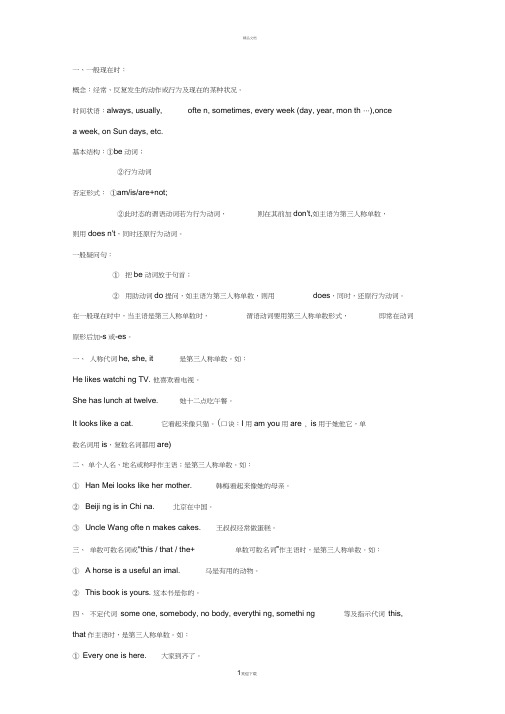
一、一般现在时:概念:经常、反复发生的动作或行为及现在的某种状况。
时间状语:always, usually, ofte n, sometimes, every week (day, year, mon th …),oncea week, on Sun days, etc.基本结构:①be动词;②行为动词否定形式:①am/is/are+not;②此时态的谓语动词若为行为动词,则在其前加don't,如主语为第三人称单数,则用does n't,同时还原行为动词。
一般疑问句:①把be动词放于句首;②用助动词do提问,如主语为第三人称单数,则用does,同时,还原行为动词。
在一般现在时中,当主语是第三人称单数时,谓语动词要用第三人称单数形式,即常在动词原形后加-s或-es。
一、人称代词he, she, it 是第三人称单数。
如:He likes watchi ng TV. 他喜欢看电视。
She has lunch at twelve. 她十二点吃午餐。
It looks like a cat. 它看起来像只猫。
(口诀:I用am you用are , is用于她他它,单数名词用is,复数名词都用are)二、单个人名、地名或称呼作主语;是第三人称单数。
如:①Han Mei looks like her mother. 韩梅看起来像她的母亲。
②Beiji ng is in Chi na. 北京在中国。
③Uncle Wang ofte n makes cakes. 王叔叔经常做蛋糕。
三、单数可数名词或"this / that / the+ 单数可数名词”作主语时,是第三人称单数。
如:① A horse is a useful an imal. 马是有用的动物。
②This book is yours. 这本书是你的。
四、不定代词some one, somebody, no body, everythi ng, somethi ng 等及指示代词this, that作主语时,是第三人称单数。
四种时态练习及答案
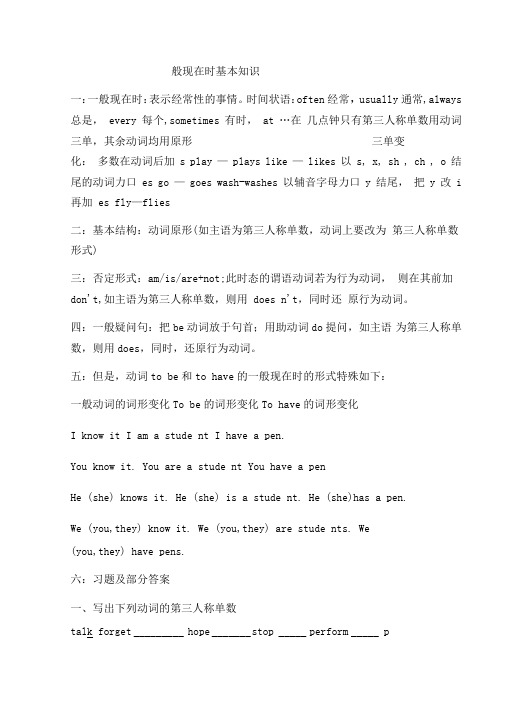
般现在时基本知识一:一般现在时:表示经常性的事情。
时间状语:often经常,usually 通常,always 总是, every 每个,sometimes 有时, at …在几点钟只有第三人称单数用动词三单,其余动词均用原形三单变化:多数在动词后加 s play — plays like — likes 以 s, x, sh , ch , o 结尾的动词力口 es go — goes wash-washes 以辅音字母力口 y 结尾,把 y 改 i 再加 es fly—flies二:基本结构:动词原形(如主语为第三人称单数,动词上要改为第三人称单数形式)三:否定形式:am/is/are+not;此时态的谓语动词若为行为动词,则在其前加don't,如主语为第三人称单数,则用 does n't,同时还原行为动词。
四:一般疑问句:把be动词放于句首;用助动词do提问,如主语为第三人称单数,则用does,同时,还原行为动词。
五:但是,动词to be和to have的一般现在时的形式特殊如下:一般动词的词形变化To be的词形变化To have的词形变化I know it I am a stude nt I have a pen.You know it. You are a stude nt You have a penHe (she) knows it. He (she) is a stude nt. He (she)has a pen.We (you,they) know it. We (you,they) are stude nts. We(you,they) have pens.六:习题及部分答案一、写出下列动词的第三人称单数talk forget _________ hope _______ s top _____ perform _____ play ______ s ay ______buy ______ w orry _____ fly _____ study _______ like ______ m ake _____take ______love ______ recite ______ become ________ come _______ drive ______shine _______leave ____ w ake ________ r ide ______ write ______ hike _____ give ___see ______ s wim ______ stop ______ s hop_______ plan ______ g et ______sit ______ l et ______cut _______ run ______ forget ______ begin ______ wash _____ watch_finish ____ teach ____ fish _______ r each _______ go ______ do _____ 二、用括号动词的适当形式填空。
初中英语 八大时态详解练习

初中英语50个必考句型+ 八大时态结构必背句型句型1:There+be +主语+地点状语/ 时间状语There're three books on the table.桌子上有三本书。
句型2:What's wrong with+sb. / sth.? What's wrong with your telephone?你的手机有什么毛病?句型3:How do you like…?How do you like China?你觉得中国怎么样?句型4:What do you like about…?What do you like about China?你喜欢中国的什么?句型5:had better(not)+动词原形You'd better ask that policeman over there.你最好去问问那边的那个警察。
句型7:Thank+sb.+for (doing) sth. Thank you for coming to see me.感谢你来看我。
句型8:So+be / 情态动词/ 助动词+主语He is a student. So am I.他是一个学生,我也是。
句型9:not…until…He didn't have supper until his parents came back.直到他的父母回来他才吃饭。
句型10:比较级十and+比较级The baby cried harder and harder.那孩子哭得越来越厉害。
句型11:the+比较级,the+比较级The more one has, the more one wants.拥有的越多,想要的越多。
句型12:…as+adj. / adv.+as……not as(so)+adj. / adv.+as…Last Sunday the weather was not so wet as it is today.上个星期天的天气不如今天的天气潮湿。
时间状语从句讲解和练习(答案)

时间状语从句用句子表达一件事情或一个行为发生的时间,这个句子就叫时间状语从句。
时间状语从句根据其所表示的时间不同,所使用的连词也不同。
下面我们一起来看一下几个常见的时间状语从句:1.when引导的从句:表示主句的动作和从句的动作同时发生,或从句的动作发生在主句动作之前。
例如:I was going out when a visitor came. (动词动作同时发生。
)我正要出门,有客人来访。
I shall tell her the good news when she comes.她来时,我将告诉她这个好消息。
小试牛刀:I found mother cooking for me. I got home.(when)_______________________________________ He was listening to the radio when I home. (get)2.while 引导的从句:表示“当……过程中”,强调某一段时间内主句和从句中谓语动词所表示的动作在同一时期发生。
由于while从句表示一个持续的行为,所以从句中要用持续性动词,并且持续性动词常用进行时态。
例如:Keep an eye on my little sister while I am away.我不在时,请照看一下我的小妹妹。
While we were watching TV, Jim came in. 我们看电视的时候,Jim进来了。
小试牛刀:It started to rain. We were playing football.(while)_______________________________________ Lucy was cleaning the room Lily was listening to music.3.as引导的时间状语从句:表示“当……的时候;一边……一边……;随着……”,其从句的主语与主句的主语往往是同一人或物。
小学英语四大时态总结(附小升初时态考题)

4. 以o结尾的单词: 有生命加s 。
tomato-tomatoespotato-potatoes无生命加espiano-pianosphoto-photoszoo-zoosradio-radios小升初时态专题综合训练1.(成都市青羊区小学毕业卷)John _____ football.A. likes playingB. likes playC. like play2.(深圳市龙岗区小学毕业卷)Does your mother _____ football?A. likeB. likesC. like play3.(芜湖市第三中学招生卷)They usually _____ TV in the evening.A. watchB. will watchC. are watchingD. watches4.(上海市奉贤区小学毕业卷)—What do you usually do on the weekend?—I often ____.A. do my homeworkB. did my homeworkC. doing my homework5. (杭州市西湖区小学毕业卷)I don’t like _____ thril lers(恐怖片)______ playing baseball.A. watching; orB. watching; andC. to watch; or6.(菏泽市晨曦中学招生卷)Bob often _____ to school.A. walkB. walksC. walked7.(南昌铁路一中初中部招生卷)My pen ______ on my desk ten minutes ago.But it _____ there now.A. is; isn’tB. was; isn’tC. is; is8.(长沙市宁乡县小学毕业卷)Mike is _____ after his classmates.A. runsB. runingC. running9.(桂林市奎光学校招生卷)Be quiet! The babies ________.A. sleepB. are sleepingC. slept10. (武汉市青山区小学毕业卷)______ he _____ his homework yesterday?A. Does; doB. Did; didC. Did; do11(北京市朝阳区小学毕业卷)—What did you do last weekend?—I ______.A. go swimmingB. did my homeworkC. went swim12.(芜湖市第十一中学招生卷)—What’s your hobby?—_____ is my hobby.A. Collecting stampsB. Collect stampsC. Stamps13.(广州市白云区小学毕业卷)—Where were you just now?—I _____ at school.A. isB. wasC. were14.(武汉市青山区小学毕业卷)______ he ______ his grandparents lastmonth?A. Did; visitedB. Did; visitC. Do; visited15.(郑州市二七区小学毕业卷)Last week, we _____ a _____ race.A. hard; runningB. have; runningC. had; running16.(福州市仓山区小学毕业卷)I______ to the park last week.A. goB. wentC. going17.(合肥市蜀山区小学毕业卷)If I _____ you tomorrow, I will give youthe receipt(收据)。
英语时间状语从句讲解与练习(完整版)

英语时间状语从句讲解与练习英语时间状语从句讲解与练习when, while 和 as 引导时间状语从句的用法这三个词的意思很简单,都有“当……时候”的意思。
但学生经常会问三个词的区别在哪儿,特别是在做选择题的时候。
别说是学生,就我个人而言,做这样的选择题要保证百分之百的正确也是不可能的。
现根据大量的实例和个人的思考,做一点小结,供大家参考。
一、when 的用法如果只从现象来看,when 从句用的最多的是一般过去时,而主句的时态没有限制,根据具体情况而定。
1. When he was a child he was always trying out new ideas. 他小时候就常常试验一些新的设想。
2. When she came into my room, I was just reading a book. 她走进我房间时,我正在看书。
3. Were you writing when the teacher came in 老师进来的时候,你在写信吗?4. Sorry, I was out when you called me. 对不起,你打电话来的时候我出去了。
5. He was on the point of leaving when someone knocked at the door. 他正要走,这时有人敲门。
6. I thought of it just when you opened your mouth. 就在你要说话的时候,我也想到了。
7. I had hardly[scarcely] closed my eyes when someone knocked at the door. 我刚一闭上眼,就有人在敲门了。
根据以上的例句,我们可以总结出一点:when 从句的A事件,相当于另一个事件B发生的时间点。
也就是说,when 从句的重点不在动作本身发生的状态,而只是把它作为一个时间点,所以when 多数情况下用的是一般过去时,则不用正在进行时。
初中英语时态讲解及练习(全)

时间状语:Tomorrow, next day(week, month, year…),soon, in a few minutes, by…,the day after tomorrow, etc.
否定形式:主语+am/is/are not going to do ; 主语+will/shall not do+其他 一般疑问句:be放于句首;will/shall提到句首。
1.I ____(write, am writing, is writing, are writing) a letter now. 2.Look, it _____(begin, is beginning, am beginning, are beginning) to rain. 3.They ____(study, is studying, am studying, are studying) medicine at the Medical Institute of Chengde these days. 4.He _____(teach, am teaching, is teaching, are teaching) an English lesson at this time.
谓语动词使用过去式形式, 加ed,分为规则和不规则变 化。表示过去经常发生的动 作,也可用“used to do ” 和“would +动词原形”。
1. He____(be, was, were, been) here a moment ago. 2. They ____(be, was, were, been) here just now. 3. The scientists _____(leave, leaves, leaved, left) for America yesterday. 4. Last week we ______(visit, visited ) the Science Museum. 5. When I was a child, I often ____(play, played) football. 6. The students ran out of the classroom as soon as the bell ____(ring, rang, rung).
高中英语时态及练习

高中英语时态及练习一、一般现在时1、表示现在发生的动作或存在的状态,常与every day,once a week,in the morning,at present等连用。
例:They don’t usually have enough money to go to the movies.2、表示主语具备的性格和能力等。
例:Mary can speak three languages.3、表示经常性或习惯性的动作,常与always,never,sometimes,often等连用。
例:I never eat fast food.4、表示现在提出的建议或要求。
例:Could you please help me with my math homework?二、现在进行时1、表示正在发生的动作或存在的状态。
例:He is studying for his history exam.2、表示现阶段正在进行的动作,但这个动作不一定正在进行。
例:My brother is preparing for his college entrance exams.3、表示即将发生的动作,常与表示将来的时间副词连用。
例:We are about to start our journey.三、现在完成时1、表示过去发生的动作对现在造成的结果。
例:I have just finished my homework.2、表示过去开始一直持续到现在的动作或状态,并可能继续下去。
例:They have been married for 20 years.四、一般过去时1、表示过去某个时间发生的动作或存在的状态。
例:We saw a movie last night.2、表示过去经常或反复发生的动作。
例:He always went to the park in the morning.高中英语时态练习英语时态是英语语法中非常重要的一个部分,也是我们在学习英语过程中必须要掌握的知识。
初中英语八大时态全套精讲及练习题(附答案)
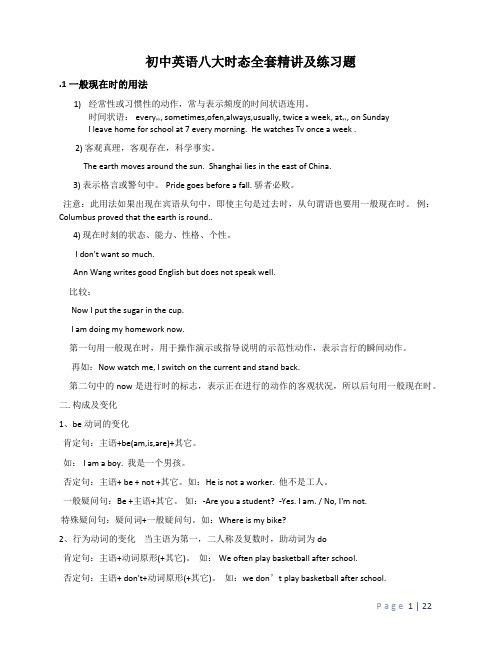
初中英语八大时态全套精讲及练习题.1 一般现在时的用法1)经常性或习惯性的动作,常与表示频度的时间状语连用。
时间状语: every…, sometimes,ofen,always,usually, twice a week, at…, on SundayI leave home for school at 7 every morning. He watches Tv once a week .2) 客观真理,客观存在,科学事实。
The earth moves around the sun. Shanghai lies in the east of China.3) 表示格言或警句中。
Pride goes before a fall. 骄者必败。
注意:此用法如果出现在宾语从句中,即使主句是过去时,从句谓语也要用一般现在时。
例:Columbus proved that the earth is round..4) 现在时刻的状态、能力、性格、个性。
I don't want so much.Ann Wang writes good English but does not speak well.比较:Now I put the sugar in the cup.I am doing my homework now.第一句用一般现在时,用于操作演示或指导说明的示范性动作,表示言行的瞬间动作。
再如:Now watch me, I switch on the current and stand back.第二句中的now是进行时的标志,表示正在进行的动作的客观状况,所以后句用一般现在时。
二. 构成及变化1、be动词的变化肯定句:主语+be(am,is,are)+其它。
如: I am a boy. 我是一个男孩。
否定句:主语+ be + not +其它。
如:He is not a worker. 他不是工人。
各种时态的时间状语及练习

与各种时态连用的时间状语一、常与一般现在时连用的时间状语:1、副词:always often never sometimes usually2、短语:every day / week / month / year once a week hardly everevery ten minutes 每十分钟every other ten minutes 每隔十分钟now and then 不时from time to time 不时另:客观事实、客观真理只用一般现在时eg: He always stud ies very hard。
They sometimes go to school on foot.Ken doesn’t clean his teeth every day.The No. 2 bus pass es here every fifteen minutes.Do you visit your uncle now and then?二、常与一般过去时连用的时间状语:1、副词:yesterday2、短语:last week / month / year / night last Mondayyesterday morning / afternoon / evening last Mayjust now = a moment ago two days agothe day before yesterday the other day 前几天in (已过去的)某年/ 月on (已过去的)某天at (已过去的)几点钟与某些从句连用eg:He always stud ied hard last year。
Mr。
Smith came to see our teacher yesterday afternoon.Did you meet him the other day?They left here at 8:00。
英语时态总结及习题(最全)

五、现在完成时1.概念:过去发生或已经完成的动作对现在造成的影响或结果,或从过去已经开始,持续到现在的动作或状态。
2.时间状语:yet,already,just,never,ever,so far,by now,since+时间点,for+时间段,recently, lately, in the past few years, etc.3.基本结构:主语+have/has +p.p(过去分词)+其他4.否定形式:主语+have/has + not +p.p(过去分词)+其他5.一般疑问句:have或has。
6.例句:I've written an article.The countryside has changed a lot in the past few years.基础练习一、选择填空1.—Have you got any pieces of paper?—Yes, I _____ .A. have gotB. haveC. had oneD. did2.Have you ever _____ to a foreigner?A. speakB. spokeC. spokenD. to speak3.Let’s forget _____ thing.A. the allB. all theC. whole theD. the whole4.Can you find the answer _____ the question?A. toB. ofC. inD. at5.She’s never read the book before, _____ ?A. has sheB. hasn’t sheC. isn’t sheD. wasn’t she?二、用所给动词的适当形式填空1.I ____ just ____ (finish) my homework.2.He ____ (go) to school on foot every day.3. ____ you ____ (find) your science book yet?4.If it ____ (be) fine tomorrow, I’ll go with you.5.She doesn’t like the childr en ____ (play) in the room.6.The students ____ (read) English when the teacher came in.7.Look! The monkey ____ (climb) the tree.8.My mother ____ (come) to see me next Sunday.9.How many sheep ____ you ____ (get)? Only one.10.I’ve lost my pen. ____ you ____ (see) it anywhere?强化练习一、单项选择。
外研社七年级英语三种时态复习要点及巩固练习
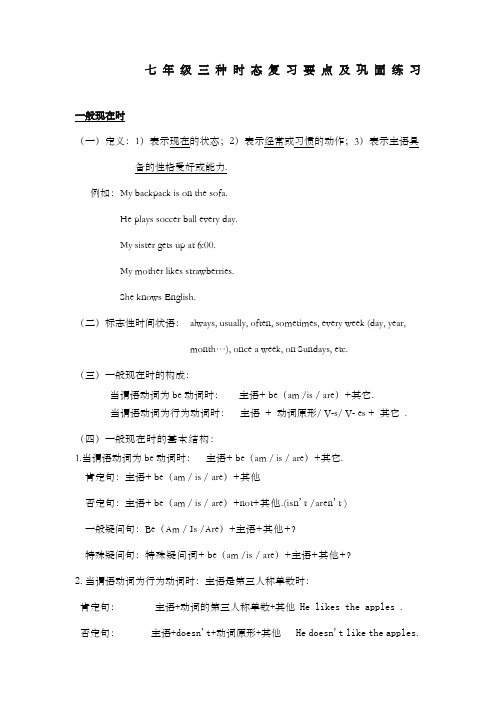
七年级三种时态复习要点及巩固练习一般现在时(一)定义:1)表示现在的状态;2)表示经常或习惯的动作;3)表示主语具备的性格爱好或能力.例如:My backpack is on the sofa.He plays soccer ball every day.My sister gets up at 6:00.My mother likes strawberries.She knows English.(二)标志性时间状语:always, usually, often, sometimes, every week (day, year,month…), once a week, on Sundays, etc.(三)一般现在时的构成:当谓语动词为be动词时:主语+ be(am /is / are)+其它.当谓语动词为行为动词时:主语+ 动词原形/ V-s/ V- es + 其它. (四)一般现在时的基本结构:1.当谓语动词为be动词时:主语+ be(am / is / are)+其它.肯定句:主语+ be(am / is / are)+其他否定句:主语+ be(am / is / are)+not+其他.(isn't /aren't )一般疑问句:Be(Am / Is /Are)+主语+其他+?特殊疑问句:特殊疑问词+ be(am /is / are)+主语+其他+?2.当谓语动词为行为动词时:主语是第三人称单数时:肯定句:主语+动词的第三人称单数+其他 He likes the apples .否定句:主语+doesn't+动词原形+其他 He doesn't like the apples.一般疑问句: Does+主语+动词原形+其他+? Does he like the apples?肯定回答: Yes,主语+does. Yes,he does.否定回答: No,主语+doesn't. No,he doesn't.特殊疑问句:特殊疑问词+一般疑问句 +? What does he like?3.当谓语动词为行为动词时:主语不是第三人称单数时:肯定句:主语+动词原形+其他 I have a pen.否定句:主语+don't+动词原形+其他 I don't have a pen.一般疑问句: Do+主语+动词原形+其他+? Do you have a pen?肯定回答: Yes,主语+do. Yes,I do.否定回答: No,主语+don't. No,I don't.特殊疑问句:特殊疑问词+一般疑问句+? What do you have ?(五)动词的第三人称单数形式的变化规则(请用心记住新目标英语七年级教材上册PP97-98表格内容)第三人称单数作主语时,谓语动词用单数,其变化规则有:1.一般情况,在动词词尾加s;2.以字母s, x, ch, sh, o结尾的动词,加es;3.以e结尾的动词,加s;4.以辅音字母加y结尾的动词,先变y为i,再加es5.以元音字母加y结尾的动词,加s;6.特殊:have→has are→is现在进行时(一)定义:表示现在(说话瞬间)正在进行或发生的动作,也可表示当前一段时间内的活动或现阶段正在进行(二)标志性时间状语:now, listen! look! at this time, these days, etc.(三)构成: 主语+助动词be( am/ is / are / ) +动词-ing(现在分词)形式+其它。
初中英语 时间状语从句与时态专项
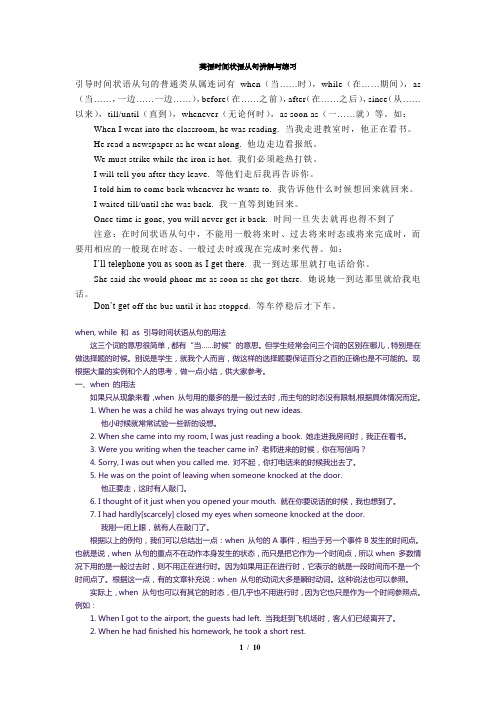
英语时间状语从句讲解与练习引导时间状语从句的普通类从属连词有when(当……时),while(在……期间),as (当……,一边……一边……),before(在……之前),after(在……之后),since(从……以来),till/until(直到),whenever(无论何时),as soon as(一……就)等。
如:When I went into the classroom, he was reading. 当我走进教室时,他正在看书。
He read a newspaper as he went along. 他边走边看报纸。
We must strike while the iron is hot. 我们必须趁热打铁。
I will tell you after they leave. 等他们走后我再告诉你。
I told him to come back whenever he wants to. 我告诉他什么时候想回来就回来。
I waited till/until she was back. 我一直等到她回来。
Once time is gone, you will never get it back. 时间一旦失去就再也得不到了注意:在时间状语从句中,不能用一般将来时、过去将来时态或将来完成时,而要用相应的一般现在时态、一般过去时或现在完成时来代替。
如:I’ll telephone you as soon as I get there. 我一到达那里就打电话给你。
She said she would phone me as soon as she got there. 她说她一到达那里就给我电话。
Don’t get off the bus until it has stopped. 等车停稳后才下车。
when, while 和as 引导时间状语从句的用法这三个词的意思很简单,都有“当……时候”的意思。
初中八种重要时态常用的时间状语

初中八种重要时态常用的时间状语一、The Present Indefinite Tense(一般现在时)(一)句型转换。
1、含be动词的句型转换肯定句:S2+is+.../I+am+.../S1+are+...否定句:S2+is + not +.../I+ am +not+.../S1 +are +not+...一般疑问句:Is +S2+...?肯定回答:Yes,he/she/it is.否定回答:No,he/she/it isn't.Am+I/Are+you+...?肯定回答:Yes,I am./否定回答:No,I'm not.Are +S1+...?肯定回答:Yes, we/you/they are.否定回答:No,we/you/they aren't.2、含实意动词do的句型转换肯定句:S2 +does.../S1+ do...否定句:S2+doesn't +do+.../S1+don't + do+...一般疑问句:Does+S2+do+...?肯定回答:Yes,he/she/it does. 否定回答:No,he/she/it doesn'tDo +S1+do+...?肯定回答:Yes,I/we/you/they do./否定回答:No,I/we/you/they don't.3、含实意动词V的句型转换肯定句:S2 +Ves.../S1+ V...否定句:S2+doesn't +V+.../S1+don't + V+...一般疑问句:Does+S2+V+...?肯定回答:Yes,he/she/it does. 否定回答:No,he/she/it doesn'tDo +S1+V+...?肯定回答:Yes,I/we/you/they do./否定回答:No,I/we/you/they don't.4、含there be动词的句型转换肯定句:There is...There are否定句:There is not...There are not...一般疑问句:Is there ...?肯定回答:Yes,there is.否定回答:No,there isn'tAre there ...?肯定回答:Yes,there are.否定回答:No,there aren't.注意:肯定句改为一般疑问句时:①I/we/me/us→you,my/our→your,mine/ours→yours),三人称不变), ②改be 动词的am为are,改句号为问号),③改相应的词(some→any,and→or,very much/a lot/a little→at all)(S1第一类主语):除三人称单数外的代词I/you/we/they相当于we/you/they的专有名词(Lucy and I(we), you an Lily(you),Lucy and Lily(they)和相当于they的复数名词(these boys/men/birds等时,在一般现在时,动词用原形(S2第二类主语):三人称单数代词he/she/it,相当于he/she/it的单个人名/地名Lucy(she),Jim(he) China(it)及相当于he/she/it的名词this boy(he)that girl (she) the cat(it)等,在一般现在时中,动词用三单现。
(完整版)初一英语各种时态复习及练习题
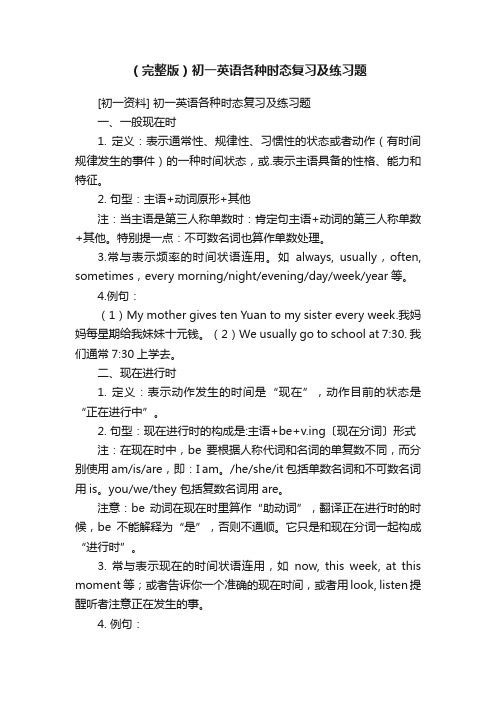
(完整版)初一英语各种时态复习及练习题[初一资料] 初一英语各种时态复习及练习题一、一般现在时1. 定义:表示通常性、规律性、习惯性的状态或者动作(有时间规律发生的事件)的一种时间状态,或.表示主语具备的性格、能力和特征。
2. 句型:主语+动词原形+其他注:当主语是第三人称单数时:肯定句主语+动词的第三人称单数+其他。
特别提一点:不可数名词也算作单数处理。
3.常与表示频率的时间状语连用。
如always, usually,often, sometimes,every morning/night/evening/day/week/year等。
4.例句:(1)My mother gives ten Yuan to my sister every week.我妈妈每星期给我妹妹十元钱。
(2)We usually go to school at 7:30. 我们通常7:30上学去。
二、现在进行时1. 定义:表示动作发生的时间是“现在”,动作目前的状态是“正在进行中”。
2. 句型:现在进行时的构成是:主语+be+v.ing〔现在分词〕形式注:在现在时中,be 要根据人称代词和名词的单复数不同,而分别使用am/is/are,即:I am。
/he/she/it 包括单数名词和不可数名词用is。
you/we/they 包括复数名词用are。
注意:be 动词在现在时里算作“助动词”,翻译正在进行时的时候,be不能解释为“是”,否则不通顺。
它只是和现在分词一起构成“进行时”。
3. 常与表示现在的时间状语连用,如now, this week, at this moment 等;或者告诉你一个准确的现在时间,或者用look, listen提醒听者注意正在发生的事。
4. 例句:(1)They are playing basketball now.现在他们正在打篮球。
(2)Listen! She is singing a song.听,她正在唱歌。
英语六大时态归纳与练习(含答案)
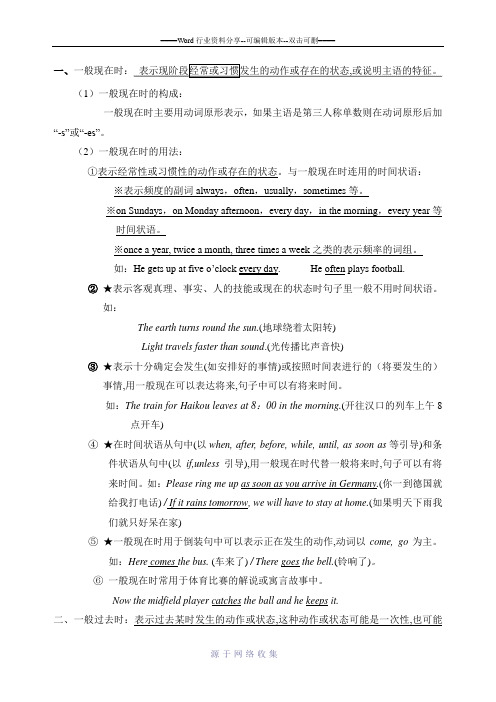
一、(1)一般现在时的构成:一般现在时主要用动词原形表示,如果主语是第三人称单数则在动词原形后加“-s”或“-es”。
(2)一般现在时的用法:①表示经常性或习惯性的动作或存在的状态。
与一般现在时连用的时间状语:※表示频度的副词always,often,usually,sometimes等。
※on Sundays,on Monday afternoon,every day,in the morning,every year等时间状语。
※once a year, twice a month, three times a week之类的表示频率的词组。
如:He gets up at five o’clock every day. He often plays football.②★表示客观真理、事实、人的技能或现在的状态时句子里一般不用时间状语。
如:The earth turns round the sun.(地球绕着太阳转)Light travels faster than sound.(光传播比声音快)③★表示十分确定会发生(如安排好的事情)或按照时间表进行的(将要发生的)事情,用一般现在可以表达将来,句子中可以有将来时间。
如:The train for Haikou leaves at 8:00 in the morning.(开往汉口的列车上午8点开车)④★在时间状语从句中(以when, after, before, while, until, as soon as等引导)和条件状语从句中(以if,unless引导),用一般现在时代替一般将来时,句子可以有将来时间。
如:Please ring me up as soon as you arrive in Germany.(你一到德国就给我打电话) / If it rains tomorrow, we will have to stay at home.(如果明天下雨我们就只好呆在家)⑤★一般现在时用于倒装句中可以表示正在发生的动作,动词以come, go为主。
高考英语状语从句和动词时态详解及练习
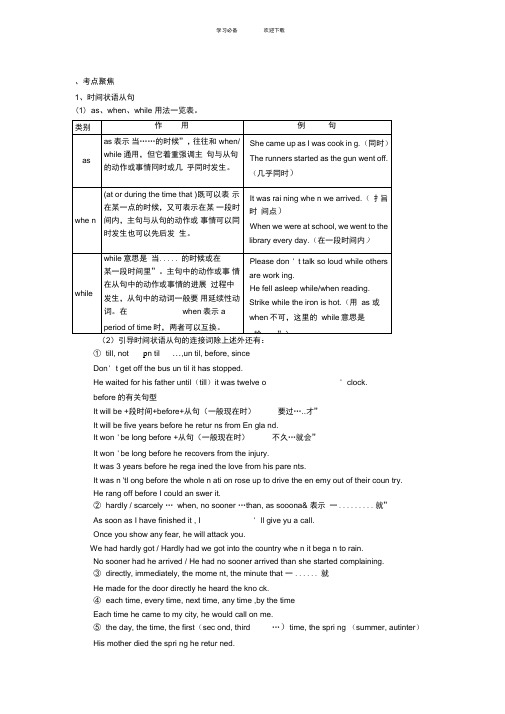
、考点聚焦1、时间状语从句(1) as、when、while 用法一览表。
(2)引导时间状语从句的连接词除上述外还有:①till, not p n til …,un til, before, sinceDon' t get off the bus un til it has stopped.He waited for his father until(till)it was twelve o ' clock.before的有关句型It will be +段时间+before+从句(一般现在时)要过…..才”It will be five years before he retur ns from En gla nd.It won 'be long before +从句(一般现在时)不久…就会”It won 'be long before he recovers from the injury.It was 3 years before he rega ined the love from his pare nts.It was n 'tl ong before the whole n ati on rose up to drive the en emy out of their coun try.He rang off before I could an swer it.②hardly / scarcely … when, no sooner …than, as sooona& 表示一......... 就”As soon as I have finished it , I ' ll give yu a call.Once you show any fear, he will attack you.We had hardly got / Hardly had we got into the country whe n it bega n to rain.No sooner had he arrived / He had no sooner arrived than she started complaining.③directly, immediately, the mome nt, the minute that 一...... 就He made for the door directly he heard the kno ck.④each time, every time, next time, any time ,by the timeEach time he came to my city, he would call on me.⑤the day, the time, the first(sec ond, third …)time, the spri ng (summer, autinter)His mother died the spri ng he retur ned.注意:表示未来情况,主句用将来时,从句用现在时。
中考英语八大时态精解+精练+答案

中考英语八大时态精解+精练+答案一、一般现在时1、概念:表示经常发生的情况;有规律出现的情况;总是发生的;事实真理。
2.时间状语:Always, usually, often, sometimes, every week (day, year, month…), once a week (day, year, month…), on Sundays (on Mondays…), etc.3.基本结构:主语+动词原形(如主语为第三人称单数,动词上要改为第三人称单数形式)4.否定形式:主语+am / is / are+not+其他;此时态的谓语动词若为行为动词,则在其前加don't,如主语为第三人称单数,则用doesn't,同时还原行为动词。
5.一般疑问句:把be 动词放于句首;用助动词do 提问,如主语为第三人称单数,则用does,同时,还原行为动词。
eg:①It seldom snows here. 这里很少下雪。
②He is always ready to help others. 他总是乐于帮助别人。
③Action speaks louder than words. 事实胜雄辩。
二、一般过去时1.概念:过去某个时间里发生的动作或状态;过去习惯性、经常性的动作、行为。
2.时间状语:ago,yesterday,the day before yesterday,last week,last (year,night,month…), in 1989, just now, at the age of 5, one day, long long ago, once upon a time,etc.3.基本结构:主语+动词的过去式或be 的过去式+名词4.否定形式:主语+was / were+not+其他;在行为动词前加didn't,同时还原行为动词。
5.一般疑问句:was 或were 放于句首;用助动词do 的过去式did 提问,同时还原行为动词。
初中英语八大时态的详细讲解与练习
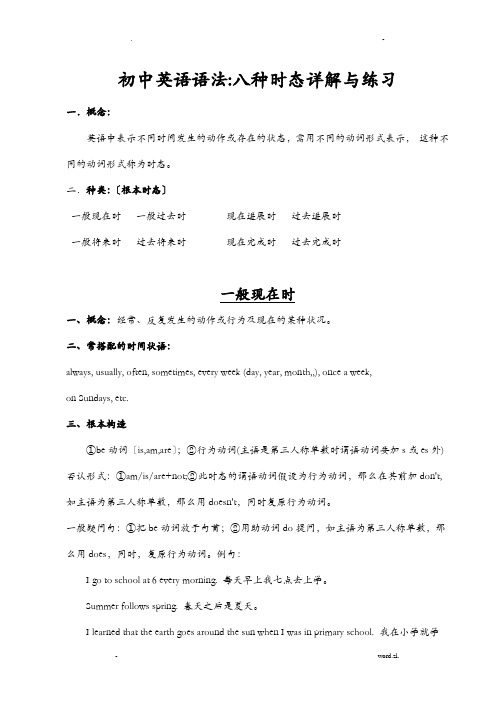
初中英语语法:八种时态详解与练习一.概念:英语中表示不同时间发生的动作或存在的状态,需用不同的动词形式表示,这种不同的动词形式称为时态。
二.种类:〔根本时态〕一般现在时一般过去时现在进展时过去进展时一般将来时过去将来时现在完成时过去完成时一般现在时一、概念:经常、反复发生的动作或行为及现在的某种状况。
二、常搭配的时间状语:always, usually, often, sometimes, every week (day, year, month…), once a week,on Sundays, etc.三、根本构造①be动词〔is,am,are〕;②行为动词(主语是第三人称单数时谓语动词要加s或es外) 否认形式:①am/is/are+not;②此时态的谓语动词假设为行为动词,那么在其前加don't,如主语为第三人称单数,那么用doesn't,同时复原行为动词。
一般疑问句:①把be动词放于句首;②用助动词do提问,如主语为第三人称单数,那么用does,同时,复原行为动词。
例句:I go to school at 6 every morning. 每天早上我七点去上学。
Summer follows spring. 春天之后是夏天。
I learned that the earth goes around the sun when I was in primary school. 我在小学就学过地球是围绕太阳转的。
Pride goes before a fall. 骄者必败。
四、根本用法:1) 描述当前时间经常出现、反复发生的动作或存在的状态。
在这种情景中,句子常带有表示频率的时间状语:always , everyday , often , once a week (month , year , etc.) , sometimes , seldom , usually等等,以表示句中的动作或状态是习惯性的、经常性的。
- 1、下载文档前请自行甄别文档内容的完整性,平台不提供额外的编辑、内容补充、找答案等附加服务。
- 2、"仅部分预览"的文档,不可在线预览部分如存在完整性等问题,可反馈申请退款(可完整预览的文档不适用该条件!)。
- 3、如文档侵犯您的权益,请联系客服反馈,我们会尽快为您处理(人工客服工作时间:9:00-18:30)。
与各种时态连用的时间状语、常与 一般现在时 连用的时间状语: 1、副词: alwaysoften never sometimes usually2 、短语: every day / week / month / year once a week hardly everevery ten minutes 每十分钟 every other ten minutes 每隔十分钟now and then不时 from time to time 不时另: 客观事实、客观真理只用一般现在时 eg: He always stud ies very hard. They sometimes go to school on foot. Kendoesn 't clean his teethevery day .The No. 2 bus pass es here every fifteen minutes .、常与 一般过去时 连用的时间状语: 1、副词: yesterday2、短语: last week / month / year / nightlast Mondayyesterday morning / afternoon / evening last May、常与 现在完成时 ( has / have done ) 连用的时间状语: 1、副词: already yet just ever before never recently2、短语: how long for + 一段时间 these five years by far so far since + 时间点 how many times in these / those daysDid you meet himthe other dayTheyleft here at 8:00Andrew ' s fatherwent t o Australiain 1978 .He went to sleep after he finished his homework. Ididn ' t hear from hima week agoMr. Smithcame to see our teacher The sports meet began on September 20Do you visit your unclenow and thenjust now = a moment ago two days ago the day before yesterday the other dayin已过去的)某年 / 月onat (已过去的)几点钟 前几天(已过去的)某天 与某些从句连用eg: He always studied hard last yearyesterday afternoon次数has lived in Syd ney since 1986have arrived here two days before . 比较: They arrived here two daysHave you found oneyetHow long have you worked as a doctor四、常与 现在进行时(is / am / are doing )连用的时间状语:1、 副词:now2、 某些警示性动词如: look liste neg: Look! They are play ing football. Heisn ' t readingEnglishnow. 五、常与 过去进行时(was / were doing ) 连用的时间状语: at this / that time yesterday; at 10:00 last night; from 7:00 to 8:00 yesterday morning; whe n / while 从句 eg: Iwas doing my homework at this time yesterday evening. Were you watching TV at 8:00 . last FridayHe was n' t doing his sums whe n I came to his house. Theywatched me while I was making a cake.六、常与 一般将来时(will / shall / be going to do )Our school will buildanother library in 2004 .Tomwill leave for Beijing 「after 9: 00 o ' clockat 9: 00 oHow soon will you write to Anneeg: He Theyago.have ever bee n to Guan gzhou but Ihave n ever bee n to HK.Annehasn ' t lived here for four mon ths1、副词: tomorrow2、短语: next Sun day / week / month / yearhow soonin + 时间段/ (将来的)某年 / 月after +on ( 将来的)某天in the future eg: We will have an En glish Evening tomorrow .时间点连用的时间状语:clockHe' ll be back in two hoursShe will be ten years old on Saturday next week.七、常与过去完成时(had do ne)连用的时间状语: by the end of last …; before / after 从句;by yesterday / last Monday宾语从句八、现在完成时与一般过去时、一般现在时的区别:现在完成时强调的是动作虽发生或开始在过去,但跟现在有联系一般过去时则强调A) 过去某一具体动作,可配过去的具体时间 B )过去某一时间内经常发生的动作一般现在时强调现在时间内经常发生的动作或客观事实.: I have done all my homework.I did my homework last night.I often did my homework before dinner last month.I often do my homework before dinner.He works as an engineer in a company.It never snows in Hainan Island.EXERCISES:I. Fill in the blanks with the proper forms of the following words:1. Mary usually ___________ (get) up early in the morning.2. We _______ already ___________ ( have ) supper.3. I ___________________ (call) him in half an hour.4. Sue _____________________ ( not do ) any washing last year.5. Listen! Someone _______________________ (knock) at the door.6. They ________________________ (swim) in the river at this time yesterday.7. He ______________________ (not book) the court yet.8. Lucy and Lily ____________________ (not come) to my party tomorrow evening.9. My pencil ____________ (break) while I _____________________ (draw) a horse.10. They ____________________ (play) football when I ____________ (see) them.11. He told the child that the sun ___________ ( go ) down in the west.12. What will he be when he ___________ (grow) up13. We won't begin our work until he _________ (come).14. Sue ________________ (join) the match of next July.15. How long ____________ he ____________ (arrive) at the station16. How soon ________ he ___________ (arrive)17. My father ______________ (work) as a doctor ten years ago.18. He never ___________ (tell) a lie when he __________ (be) a child.19. Sometimes last year, my parents __________ (come) home very late.20. The baby ____________ (drink) water every two hours.21. He ______________ (call) me every other twenty minutes yesterday.22. It _____________ (snow) heavily on the morning of last Saturday.23. By the end of last year, they _________________ (write) five songs.24. He __________ just _____________ (draw) a map.25. They _____________________ (not hand) in their homework the other day.26. He _______________________ (not come) here since last month.27. Next week, I _____________________ (stay) with my aunt for two days.28. Peter and Tim ____________________________ (not have) class at nine yesterday.29. I _______________________ (return) you the book in three days.30. Look! They __________________________ (not clean) the windows at all!II. Multiple choice:1. What ____ you _____ at this time last SundayA. did...doB. have...doneC. were...doingD. are...doing2. He said the train ____ faster than any man.A. runB. runsC. ranD. is running3. How long ___ he __ in ShenzhenA. did..eB. has...arrivedC. will...reachD. has...been4. Many people often ___ rice for supper in south China.A. haveB. hasC. hadD. are having5. She ___ always ___ angry with nothing.A. is...beingB. will...beC. is.../D. /...is6. I didn ' t know a word of English until I ____ here.A. cameB. have comeC. had comeD. was coming7. I ___ you about that many times.A. toldB. tellC. have toldD. am telling8. Water ___ at 100 0 C.9. Ken ___ up at 6:30 in the morning.A. gotB. getC. getsD. is getting10. How many English words __ you ____A. do...learnB. has...learnedC. have...learnedD. will...learn11. I ___ him just now.A. seeB. sawC. have seenD. am seeing12. He ___ his best to learn English well.A . doesn ' t B. hasn 't done C. do D. doesn 't do13. Her new shoes _______ under the bed.A. isB. areC.was D. am14. Where___ you__ ___ I 've looked for you the whole morningA. have...goneB. did. .go toC. are...goingD. have...been15. I ___ him but I __ __ tohim.A. see...didn ' t speakB. saw...spokeC. have seen...haven 't spokenD.saw...didn ' t speak英语时态综合练习(一)一、用所给词的适当形式填空:1.He ___ swimming in the river every day in summer. (go)are right. ( seem ), the children ______ basketball on the playground. ( play )the radio when I came in, ( listen )is very cold .I think it _____ . ( rain )6. I need some paper . I _____ some for you . ( bring )cant find my pen . Who _____ i t ( take )said that he _____ back in five minutes . ( come )didnt meet him. He ______ when I got there. ( leave )bike, so I have to walk to school. ( lose ) and began to read his newspaper. ( sit )A. boilsB. is boilingC. has boiledD. boiledis very hungry. He ________ anything for three days. ( not eat )you if I have time . ( go )will go to the cinema if it ____ fine . (be )will tell her the news when she ____ to see me next week. (come)16. When you _____ the car In 1998 . ( buy )friends since we met at school . (be)at five yesterday afternoon (do)bike is nice . How much _____ i t _____ (cost)二、选择最佳答案填空()go swimming if the weather ______ fine tomorrow.A. is C. will be going to be()years since he has left for Beijing.A. wasB. has been going to be()dont leave the office until your friend _______ back.come come()the end of last year he _______ about 1500 English words.A. learns learning learned()! Someone ______ in the next room .crying cried()must tell him the news as soon as you _____ him.see seeing()told me that he _______ t o see us the next day.B. cameC. will comeD. would come()cant find him anywhere . Perhaps he _______ home.A. is goingB. wentC. has comeD. would come()teacher told us that the sun ______ bigger than the earth.A. isB. wasC. has been be()you tell me where the railway station _______A. wasB. isC. will beD. would be()the Great Wall several times.A. goB. were goingC. have gone been()seemed that the old man _______ for something over there.A. looksB. lookedC. was lookingD. has looked()was sure that he ________ his wallet in the office .A. leftB. would leaveC. had leftD. has left( ) must study hard if you _______ want to fail the exam. A. wontB. dontC. haventD. hadnt( ) 15. Im afraid you cant sit here . Sorry , I ________ k now. A. dont B. wont C. cant D. didnt( ) 16. As she ______ t he newspaper , Granny _____ a sleep. A. read , was falling B. was reading fell C. was reading , was falling fell ( ) 17. Jim is not coming tonight .But he ______ !A. promises (许诺)B. promisedC. will promise ( ) 18. Whats her nameI _______ .A. forgetB. forgotC. had forgotten三、动词时态能力综合测试( ) often _______ his clothes on Sundays. A. washing B. washes C. has washed D. wash) Chinese. Where ______ from A. do you come B. you are coming C. you comeD. are you coming( ) school.A. never walksB. is never walkingC. walk neverD. never is walking( ) will start as soon as our teacher ________ . A. comesB. will comeC. comeD. is coming( ) long ago ________ p laying football A. have you stoppedB. had you stoppedC. did you stopD. do you stop( ) hard when I left my house . A. is rainingB. rainsC. was rainingD. will rain( ) think this question ______ to answer. A. easyB. is easyC. was easyD. will easy( ) 8. Dont talk so loudly . Your father ______ . A. sleeps B. is sleeping C. sleptD. had slept( ) many people does the doctor know who ______ of the disease (疾病 )D. had promisedD. am forgettingto beagain in a few weeks.A. will seeB. have seenC. had seen( ) 23. By the end of last term we ______ English for two years. A. have studied B. have been studied C. would studied D. had studied ( ) Brown ________in New York for three years before she went to London.( ) we arrived , the dinner _______ .() homework now.A. finishB. finishedC.have finishedD()three years.A. has joinedB. has been in the armyC.joined D.()grandfather___ ___for thirty years.A. diedB. was deadC. has been deadD. has diedhad finished( ) from my brother for a long time. A. not have heardB. have not heardC. have heard notD. do not hear( ), one of the most important subjects, _______ a lways interested him. A. has B. haveC. areD. is) your brother go to America last year A. No , he did never go there B. No , he has never gone here C. No , he never was there D. No , he has never been there( ) that factory since 1958. A. has leftB. has worked inC. has gone fromD. has come to( ) teacher _______ t o Beijing three times. A. wentB. had goneC. has goneD. has been( ) week John _______ his leg.A. felt and brokenB. fell and brokeC. feels and breaksD. ( ) thick coat because it was snowing. A. puts onB. put onC. takes onD. took on( ) picture on the wall.fallen and brokenA. hangedB. hungC. has hangedD. was hangedmonthtwenty five.A. has my sisterB. my sister will beC. my sister shall have my sister is goingD. have been seenA. livedB. had livedC. has livedD. will liveA. are dyingB. is dyingC. has diedD. dieshas served the armyA. already beganB. has already begunC. had already begunD. was just begun()will go home for the holiday as soon as I _______ my exams.A. will finishB. finishC. finishingD. finished(), Ill talk to him.A. does Peter comeB. Peter will comeC. Peter comesD. can Peter come()sister ______ t o see me . Shell be here soon.A. comesB. is comingC. had comeD. came()said they _______ our answer the next day .A. had heardB. would hear ofC. would hearD. will hear()old man said that light _______ faster than sound.A. wentB. will goC. travelsD. will travel动词时态专项训练(答案)一、 1. goes 2. seems 3. are playing 4. was listening rain 6. will bring7. took 8. would come 9. has left 11. sat 12. hasn't eaten 13. will go 14.is 15. comes 16. did buy 17. have been 18. were doing 19. does cost二、 1. A 2. B 3. B 4. D 5. C 6. A 7. D 8. C 9. A 10. B 11. D 12C 13 . C 14. B 15. A三、 1. B 2. A 3. A 4. A 5. C 6. C 7. B 8. B9. A 10. C 11. B 12. C 13B 14. D 15. D 16. B 17. D 19. B 20. B 21. B 23. D 24. B 25.C 26. B27. C 28. B 29. C。
